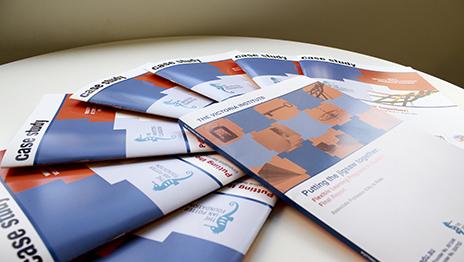Report launch: Flexible learning programs - what works and why
This event has already taken place.
Join Associate Professor Kitty te Riele of The Victoria Institute for the launch of a new landmark report investigating 'who gets what' as well as 'what works and why' in flexible learning programs in Australia on Friday, 5 September 2014.
Ms Janet Hirst from the Ian Potter Foundation will open proceedings at 3.00pm at Victoria University's City Queen Campus. The event will feature the work of a 2 year long research project, generously funded by The Ian Potter Foundation, with additional support from the Dusseldorp Forum and federal government's Cooperative Research Networks scheme.
Putting the Jigsaw Together: Flexible Learning Programs in Australia has produced several outcomes, including:
- a database of over 900 flexible learning programs, publicly accessible through the Dusseldorp Forum website,
- short vignettes of over 20 good practice programs,
- detailed case study reports of 8 good practice programs,
- a final report, synthesising all findings.
Educational staff from the investigated case study sites will also share their experiences at the event. Their first hand stories will allow attendants a unique insight into some of Australia's best flexible learning programs.
Register now to attend the launch. Light refreshments will be provided.
Flexible learning programs in Australia
Australia has over 900 alternative and flexible learning programs operating across the country, enabling over 70,000 marginalised young people to learn and gain secondary school qualifications each year.
The research by Associate Professor Kitty te Riele demonstrates that flexible learning programs play a vital role in Australia's education sector and that much can be learned from their creative approaches.
"Students enrolled in these programs were at one point at risk of not completing their education. Flexible learning programs utilise more meaningful and engaging practices to educate learners for whom mainstream channels have not worked," says Kitty.
"The benefits of enabling young people to finish their secondary school education pay personal and economic dividends."
In a 2008 report, Deloitte Access Economics concluded that completing secondary education leads to improved participation, productivity and earning capacity for individuals. Kitty believes the evidence suggests that these programs' success warrants the investment.
"Access Economics have shown that reducing youth disengagement can potentially lead to a social return 23.6 times higher to society than the initial amount of funding. The direct dollar return to governments can be 7.6 times higher than their original investment," she says.
Despite the prevalence of flexible learning programs and the clear incentive to sustain their success, there has never been a framework or benchmarks to serve as a best practice guide - until now.
'Putting the jigsaw together' has established the Framework for Quality Flexible Learning Programs, aimed specifically at the Australian context.
"The nature of flexible learning programs means that they operate in different ways. Some programs exist within mainstream schools, others operate in a TAFE or ACE, and of course there are separate stand-alone programs too", says Kitty.
"It is essential that these programs have a framework to guide them in delivering quality educational outcomes for their students.
"The framework includes clear benchmarks to enhance these programs and offers the flexibility to adopt a customised approach that suits every program's unique context and needs.
"Flexible learning programs inherently adopt dynamic educational practices. This project and report will showcase the innovative pedagogical and curriculum approaches employed by these programs."

When?
This event has already taken place.
